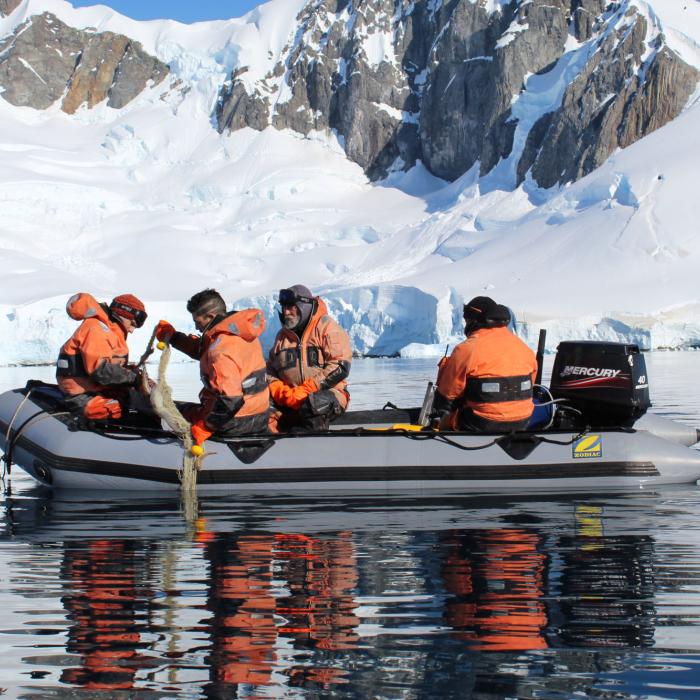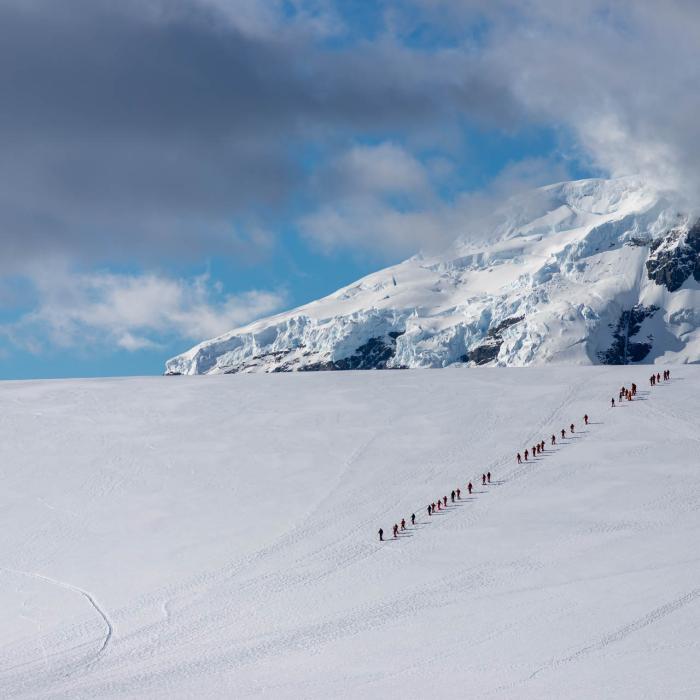
Antarctic Fellowship Recipient Announced on Antarctica Day
The International Association of Antarctica Tour Operators (IAATO) the Council of Managers of National Antarctic Programs (COMNAP) and the Scientific Committee on Antarctic Research (SCAR) have marked Antarctica Day by announcing the recipients of this year’s Antarctic Fellowships.
The annual fellowships are an investment in the professional development of talented early career researchers and aim to further the understanding of human presence in Antarctica.
IAATO is awarding its $15,000 USD fellowship to Ross Nichols from the University of California, Santa Cruz to further research that will help IAATO operators minimise the risk of whale ship-strikes around the Antarctic Peninsula.
 2021 Antarctic Fellowship recipient, Ross Nichols
2021 Antarctic Fellowship recipient, Ross NicholsRoss said: “Investigating questions regarding overlap between whales and humans in the Antarctic cannot come at a more important time. I feel privileged for the ability to work with IAATO in developing best practices to further safeguard whales around the Antarctic Peninsula.”  The announcement comes on a day which holds a very special meaning for the polar community, the anniversary of the institution of the Antarctic Treaty. Antarctica Day, as December 1 is known, is intended to build global awareness of this landmark agreement, which this year celebrates 62 years of unique international collaboration.
The announcement comes on a day which holds a very special meaning for the polar community, the anniversary of the institution of the Antarctic Treaty. Antarctica Day, as December 1 is known, is intended to build global awareness of this landmark agreement, which this year celebrates 62 years of unique international collaboration.
On this day in 1959, 12 nations came together to sign the historic agreement, placing Antarctica’s preservation and protection at the heart of its international governance, and designating Antarctica ‘a natural reserve, devoted to peace and science’ in perpetuity.
Amanda Lynnes, IAATO Director of Environment and Science Coordination, said: “We are delighted to award this year’s fellowship to Ross on a day so significant to the polar family and for research that is hugely important to us.
“In 2019 IAATO members implemented a mandatory 10kn speed limit to prevent whale strikes in cetacean-rich Antarctic waters within geofenced time-areas along the Antarctic Peninsula. Ross’s work will help us refine our practices to protect whales by understanding in more detail where and when whales are at greatest risk from ships.”
 Amanda Lynnes, Director of Environment and Science Coordination, IAATO.
Amanda Lynnes, Director of Environment and Science Coordination, IAATO.It was in support of the Antarctic Treaty’s unique mission that IAATO came into being 30 years ago, and three years ago launched the Antarctic Fellowship with the intention of supporting talented early-career researchers, scientists, engineers, environmental managers, and other professionals. The purpose is to strengthen international capacity and cooperation in fields such as climate, biodiversity, conservation, humanities, and astrophysics research by providing annual funding opportunities.
COMNAP Engagement, Information and Project Manager Andrea Colombo, said: “We are pleased to join IAATO in announcing the award of Antarctic Fellowships as part of our on-going scheme supporting early-career researchers in launching their Antarctic careers. These Antarctic Fellowships are a genuine opportunity for early-careers persons to create new partnerships and strengthen international collaborations that are worthy of remark. COMNAP is awarding the Antarctic Fellowship 2021 to Paola Barros Delben from the Federal University of Santa Catarina, Brazil, and Renan Lima from the Universidade Federal do Rio Grande, Brazil.”
SCAR Executive Officer Eoghan Griffin said: "SCAR is pleased to announce its 2021 Fellowship awards in conjunction with COMNAP and IAATO on Antarctica Day, with David Vendrami visiting UK from Germany, Lumi Haraguchi visiting South Africa from Finland, Lisa Craw visiting UK from Australia, Natalia Gimena Rosciano visiting USA from Argentina and Fernando Luis Hillebrand visiting Germany from Brazil."
About Ross Nichols, IAATO 2021 Antarctic Fellowship Recipient
Ross grew up in Aromas, California, a small town located inland of the Monterey Bay. Originally interested in working with animals in natural environments, Ross gravitated to marine science during high school, inspired by a course in marine biology. He pursued this interest with an undergraduate degree in Marine Biology followed by an M.S. degree in Ocean Sciences from UC, Santa Cruz. Ross was also part of a cognition and bioacoustics laboratory investigating the effects of high impulse noise on Artic seal species. He has pursued many opportunities working in remote field sites in Hawaii, California, Massachusetts and the Antarctic, performing scientific monitoring of seabird, pinniped and cetacean species.
Most recently, Ross has been part of the Bio-Telemetry and Behavioural Ecology Laboratory advised by Dr. Ari Friedlaender at the University of California, Santa Cruz’s department of Ocean Sciences. Here, Ross has focused on investigating seasonal effects of Antarctic ecosystems and their interaction with the phenology and foraging ecology of humpback whales. His current projects involve investigating bubble net feeding behaviour and, separately, questions regarding anthropogenic interactions of Antarctic humpback whales.
